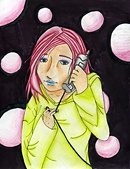All Nonfiction
- Bullying
- Books
- Academic
- Author Interviews
- Celebrity interviews
- College Articles
- College Essays
- Educator of the Year
- Heroes
- Interviews
- Memoir
- Personal Experience
- Sports
- Travel & Culture
All Opinions
- Bullying
- Current Events / Politics
- Discrimination
- Drugs / Alcohol / Smoking
- Entertainment / Celebrities
- Environment
- Love / Relationships
- Movies / Music / TV
- Pop Culture / Trends
- School / College
- Social Issues / Civics
- Spirituality / Religion
- Sports / Hobbies
All Hot Topics
- Bullying
- Community Service
- Environment
- Health
- Letters to the Editor
- Pride & Prejudice
- What Matters
- Back
Summer Guide
- Program Links
- Program Reviews
- Back
College Guide
- College Links
- College Reviews
- College Essays
- College Articles
- Back
McWorld vs. Jihad: A Contemporary Dilemma
In 1995, Benjamin R. Barber proposed in his book McWorld vs. Jihad a world with two adversarial forces that are simultaneously shaping it and tearing it apart, McWorld and Jihad. While McWorld denotes the integration of the globe through technology, ideology, and corporate expansion, the basis of Jihadism is divisions, or the tribalization of cultures. From my review of postwar American history, although Jihad is dangerous, I regard McWorld as more so in its attempt to deepen alienation, encourage conformity, and homogenize thinking.
To begin with, McWorld might lead to greater alienation under the surface of collective communities. From its etymology, the term “Jihad” (or Holy War) refers to the moral armed struggle of Islam fundamentalist believers against the faithless. Using Jihad battles as subject matter in homogenized newscasts, the increasing wave of McWorldism seen by a larger public will cause Jihad tribes to withdraw into even greater isolation. Thus, without attempts for active communication, an ever-deepening alienation between the neighborly majority and marginalized groups might arise (McRorie). For example, the dual interpretations of the American Dream from the black and the white race indicate the latent alienation of Jihadism under the wave of McWorld. In Facing Up to the American Dream (1995), Jennifer L. Hochschild noted that contemporary white people believe that African Americans are now included in the dream in their increasing visibility in workplaces and culture; however, even the most successful blacks think that they have made it less on their efforts than on special programs offered to their race. Under the harmonious surface lies the unspeakable tension, alienation, and crisis of the American dream. Thus, the racial Catch-22 dilemma black people are involved in denotes the disharmony simmered below the surface of the glamorous American Dream, an intellectual form of McWorldism.
Forging ahead, though the two forces are inseparable, McWorld greedily feeds off Jihad, in a sense that it dissembles concepts such as collectivism in the form of Jihad-driven hostility. The perceived “domino effect” that stimulated the Vietnam War showed American ignorance of Southeast Asian countries’ self-independence, with its failure proving that no single ideology could capture the essence of all countries. During the war, to affirm the credibility of global anti-communist alliances, US forces lost nearly 58,000 dead and some 300,000 wounded, in a conflict whose political purpose was poorly understood by Americans.
With “the decline of the Age of Typography and the ascendancy of the Age of Television (Postman),” McWorld also displays in entertainment industries, which poses great threats towards people’s cognition and rationality. In Amusing Ourselves to Death, Postman laments the lack of thinking “when a people become an audience, and their public business a vaudeville act.” This description brought about my reflection on the role of television-based epistemology in shaping people’s thoughts. In the post-truth era, emotional appeals replace objective facts in reportage, and I often find myself fervently following the voice of mainstream media, realizing in hindsight that I was led astray by inflammatory words and unsubstantial reportage. Without sufficient counterparts such as print culture against show business, we indulge ourselves in immediate gratifications of visions, uncritically accepting others’ reflection and omitting our own arguments. The US forces in the South also used terror tactics against the other side, including the massacre of an entire village at My Lai by American troops, expanding plastic culture that breeds rush results and maximizes profits, manifested in McWorldism, we are orienting a life that is ultimately “amusing ourselves to death.”
Walt Whitman once expressed, “I am large / I contain multitudes.” Resonating with this idea, Benjamin R. Barber has created the Walt Whitman Center for the Culture and Politics of Democracy to bring people together to design projects that encourage democracy. Albeit my standpoints that McWorld alienates the minority, promoted military conformity, and homogenize thinking, the ultimate ideal is to achieve less Jihad-driven isolation, less McWorld-driven unanimity, which, from my view, shall be acquired by seeking individual freedom. With spontaneous freedom, one shall stray away from conforming blindly to acquire the superficial sense of belonging in McWorld groups, or from isolating oneself in Jihad tribes to proclaim sovereignty. Only when we are set into the web of diverse communities with apparent opposites shall we approach a more wholesome, multicultural society.

Similar Articles
JOIN THE DISCUSSION
This article has 0 comments.
